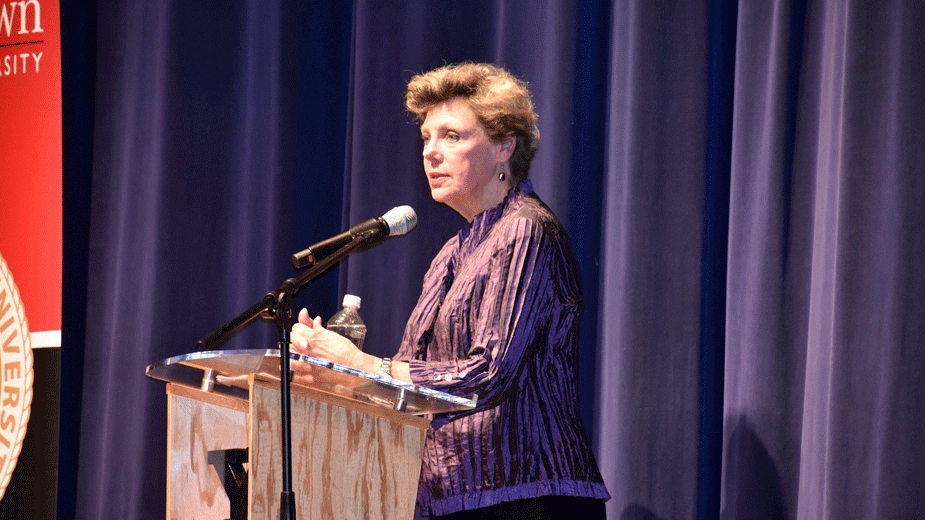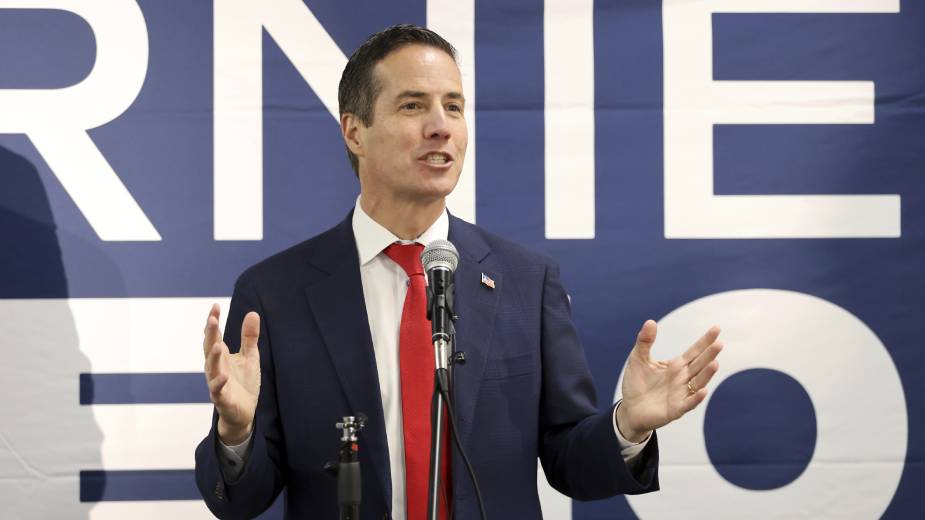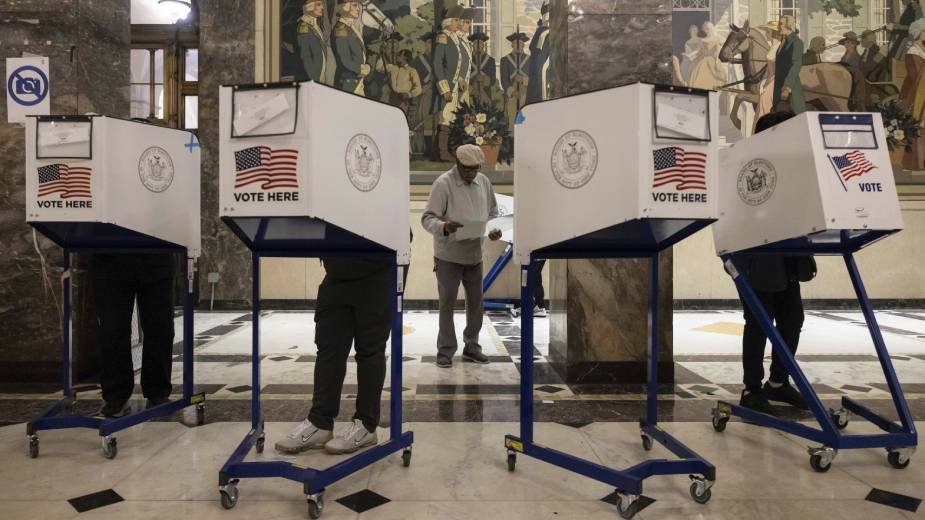Roberts Shares Insights on Political Landscape
YOUNGSTOWN, Ohio – A wave election benefiting Democrats isn’t a given this year, despite opposition to President Donald Trump and other factors working against Republicans, journalist Cokie Roberts said.
Roberts, a political commentator for ABC News and National Public Radio, spoke last night at Stambaugh Auditorium. The lecture was sponsored by NPR affiliate WYSU-FM and St. John’s Episcopal Church.
During her lecture and while meeting with local journalists prior to the event, Roberts addressed a range of issues that included the climate in Congress, the political environment in the era of President Donald Trump, the impact of the #MeToo movement and the Electoral College.
Energy is “certainly on the anti-Trump side” and the women’s movement that has arisen in the past year “certainly contributes to that,” Roberts acknowledged. In Alabama, women and minorities contributed to the defeat of GOP Senate candidate Roy Moore, she pointed out.
“You could see a Democratic wave,” she continued. “It’s very hard for Democrats to pull off. However, given the drawing of the [congressional] district lines and the Senate seats that are up — every day another Republican resigns and some of them – not all of them — are resigning from swing seats.”
Roberts attributed partisan divisions in part to how congressional districts are drawn, resulting in representatives who are essentially chosen by more partisan voters in the primaries and are more reluctant to try to find compromise. Republicans reject ideas that originate with Democrats, and vice versa.
“They agree that the Children’s Health Insurance Program needs to be extended but they can’t get there, and they agree on Iran,” she said. “It’s all a mess because of this hyper-partisanship.”
A daughter of the late Hale Boggs, a former Majority Leader in the U.S. House of Representatives, and Lindy Boggs, who succeeded her husband in his House seat, Roberts also noted that members of Congress of her parents’ generation were elected in the post-World War II period and “iterally had been in foxholes together” during the war. They understood that the enemy wasn’t the politician across the aisle but “the dictator across the sea,” she said.
In addition, members of Congress used to bring their families to Washington, so they got to know each other socially. They went to the same churches and their children attended the same schools.
“It’s very hard to demonize someone whose child is playing Clue in your basement,” she said. If there were political disagreements, members might think people were “wrongheaded” but not evil.
The political commentator also expressed nostalgia for the colorful characters the Mahoning Valley sent to Congress, notably the late James A. Traficant Jr. “We miss Sheriff Traficant,” she said.
Ohio is always important in presidential elections because of its status as a swing state, and this area has drawn significant attention in recent election cycles. Traditional manufacturing centers where the primary industry had closed down – steel mills, in this case – have “a group of voters that really has swung back and forth,” Roberts said.
“That’s one of the things that we look at of course in political campaigns because we know, if we go to certain parts of the country or certain cities, how everybody there is going to vote,” she said. “We don’t know how everybody here is going to vote.”
In 2016, many voters here who traditionally voted for Democrats crossed party lines to vote for Trump because of the same factors voters across the country did, Roberts said. Many white working-class people who had been put out of work are feeling “unmoored by the America they live in now,” she said.
“Their jobs aren’t the same. Their children’s prospects are not the same,” she continued. “The social milieu is different so people are feeling like they don’t recognize this America, and Donald Trump spoke very much to that group of voters.”
Trump’s dealings with the media are “different from anything anybody’s ever experienced,” but that is true about much that’s taken place during the first year of his presidency, she said.
“It’s not different for people to feel unkindly toward the media, to put it mildly, but it is different for people to, say, go after the media, say it’s the enemy and charge us with writing untruths when that’s not the case,” she said.
The challenge for media in the Trump era is to be as accurate as possible and call out political leaders when they are telling untruths. “I think everybody is doing that,” she said. “After a certain amount of gliding along, the media is on its toes and paying a lot of attention and being very careful that thorough reporting is done.”
She is concerned that focus on the Russia investigation has centered on matters of what meetings took place rather than the “fundamental travesty” of Russia’s interference in U.S. democracy. “To take our eye off the ball that the Kremlin interfered in our election is a very big mistake,” she warned.
Roberts said she is encouraged by the increase in the number of women who are expressing interest in running for office in the wake of the Women’s March on Washington a year ago and the more recent response to sexual harassment in high-profile industries. Electing more women might be one way to improve the climate in Washington, she said.
“It does make a difference,” she said. “They really do behave differently in legislative bodies.”
Although there are hyper-partisans among both women and men, women tend to be less ideological, more pragmatic and more willing to cross party lines, particularly on issues dealing with women and children. The “last little bastion of bipartisanship in the Senate” is among the women, who have a regular monthly dinner, she said.
She declined to predict when the United States might elect a woman president because “every election is so in its time and place,” she said. If the right person emerges in the right time and the right place, it could be 2020 or it could be later.
During a question-and-answer session, Roberts offered a defense of the Electoral College, which many Democrats have called for abolishing following two elections – i2000 and 2016 – in which Republicans won the presidency while losing the popular vote.
“If it weren’t for the Electoral College, it would be a national election,” relying even more on who had the money to wage a full-scale national campaign, she cautioned. Minorities might represent smaller percentages of the overall population but larger shares in certain states potentially would be ignored without the Electoral College, she said.
“Certainly in Ohio, how could we be against the Electoral College?” said Paul Sracic, professor and chairman of politics and international relations at Youngstown State University, who attended the lecture. “If you didn’t have the Electoral College, every presidential candidate’s no longer going to show up in Youngstown, Ohio as they do every four years.”
Roberts presented “an excellent and refreshingly bipartisan view of American politics,” Sracic said. He acknowledged that political culture needs a change “and to the degree that having more women involved can bring about that change is certainly a good idea.”
Elayne Bozick of Coitsville said she was surprised by Roberts’ support for the Electoral College. “After listening to her rationalization, I can understand it,” she said. “I wish she would run for president.”
“As many different perspectives as you can have in an organizing body, the better,” affirmed AnnaMarie Jadoo of Austintown, a senior at YSU.
Copyright 2024 The Business Journal, Youngstown, Ohio.



